Colorectal Cancer in Malaysia: Symptoms, Prevention and Treatment Options
05 April 2019
The colon is the large intestine with the rectum being the last part of the large intestine. Colorectal cancer is a malignant growth that occurs in either the colon or rectum, making it one of the most serious forms of cancer. Colorectal cancer is currently the most common cancer in men and third most common cancer in women in Malaysia. The most common type of colorectal cancer is the adenocarcinoma. Most of these colorectal cancers start as small growths called polyps, which can be single or multiple, flat or stalked, small or large in size.
Risk Factors of Colorectal Cancer
Several important factors increase the risk of developing colorectal cancer.
Genetic Factors
Genetic factors play a significant role, particularly a family history of colorectal cancer, breast cancer, ovarian cancer, or endometrial cancer. Inherited conditions such as familial adenomatous polyposis (FAP) and hereditary non-polyposis colorectal cancer (HNPCC) also increase the risk. However, it is important to note that the most cases of colorectal cancer do not have an identifiable genetic risk factor.
| Men | Women | |
|---|---|---|
| Chinese | 31.5 | 26.2 |
| Indian | 15.7 | 12.9 |
| Malay | 12.3 | 9.7 |
Malaysian colorectal cancer rates per 100,000
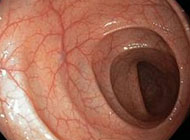
Normal Colon
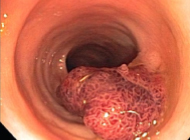
Colon Polyp
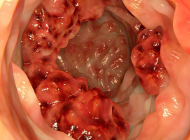
Colon Cancer
Environmental Factors
Environmental factors such as colon inflammation causes, smoking, and alcohol consumption also contribute to the development of colorectal cancer. Increased intake of red meat, in particular cooked red meat as well as an increased intake of total calories have been implicated to increase the risk of colorectal cancer development.
While a protective effect is seen with consumption of greater amounts of dietary fibre. Fruits and vegetables besides their fibre content, contain a number of antioxidants and other anticancer compounds giving an additional protective effect. Smoking and alcohol consumption also increase your risk of colorectal cancer.


Obesity and physical inactivity are known risk factors, as is a previous history of colorectal polyps or cancer. A history of inflammatory bowel disease (IBD), diabetes, or previous radiation therapy can further increase the risk of colorectal cancer. As we age, the likelihood of developing colon cancer also increases, making early screening especially important.
Signs and Symptoms of Colorectal Cancer
While most patients with colorectal cancer present with some symptoms, a significant number of patients may have none at all. Common irritated colon symptoms include:
- Rectal bleeding
- Altered bowel habit
- Passage of small calibre stools
- Persistent abdominal discomfort
- Excessive flatulence
- Abdominal mass
- Feeling of incomplete emptying of bowel motion
- Weight Loss
Any person with the above symptoms should see a doctor for further assessment.
Colorectal Cancer Diagnosis
The gold standard for colorectal cancer diagnosis is the colonoscopy. This is where a small flexible fibreoptic scope is inserted through the anus to visualise the entire colon and rectum. During this procedure, polyps can be removed, tumours biopsied, and any bleeding stopped. A CT colonoscopy is a virtual colonoscopy perfromed using a CT scan, though it cannot biopsy or remove polyps. A barium enema is rarely used today due to the high completion rates of colonoscopies.
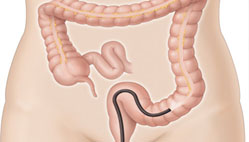
Tumor markers in the form of blood CEA levels to detect colorectal cancer are not accurate as they have a low sensitivity and low specificity. However, recent advances to look at molecular genetics from a blood test (colonsentry) to assess risk of colorectal cancer development is promising.
Staging for Colorectal Cancer
Once diagnosed with colorectal cancer, the cancer is the further assessed with imaging techniques such as an endorectal ultrasound, CT scan or an MRI scan. To assess the spread of the tumor, a PET/CT scan can be performed. These investigations help to stage the colorectal cancer, with four stages:
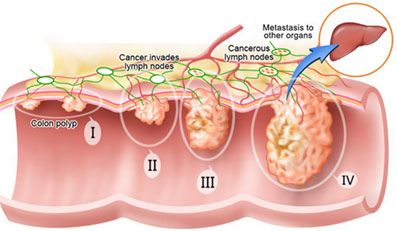
| Stage 1: | The cancer is within the lining of the colon |
| Stage 2: | The cancer has spread through the thickness of the entire colonic wall |
| Stage 3: | The cancer has spread to the lymph nodes |
| Stage 4: | The cancer has spread to distant organs such as liver or lungs |
Treatment for Colorectal Cancer
The main aspects of treating the colorectal cancer includes surgery, chemotherapy and radiotherapy. Factors determining the modalities used will depend on the site of the cancer, size of the cancer and stage of the cancer.
Surgery
Surgery involves the removal of the cancer by cutting the cancer out. This can be done through the colonoscope for small cancers, keyhole (laparoscopic) surgery or open surgery for larger cancers. When part of the large intestine has been removed, the remaining intestine will be re-joined to allow the patient to pass motions normally. Sometimes a temporary colostomy bag may be required to allow healing to take place, and rarely a permanent colostomy bag is necessary.
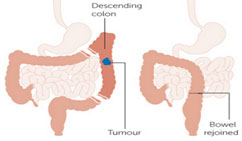
Chemotherapy
Chemotherapy is the use of special drugs to kill cancer cells. This can be given as tablets or injections or in an infusion. Chemotherapy is usually necessary in stage 3 and beyond colorectal cancer. The chemotherapy can sometimes be given before surgery to shrink the tumor size prior to surgery. Targeted therapy is the use of specialised drugs that target specific areas of the cancer cell to kill the cancer cell.
Radiotherapy
Radiotherapy is the use of strong x-rays to help kill any cancer cells, particularly for rectal cancer. Radiotherapy can be used either before or after surgery and can also be used together with chemotherapy. Radiotherapy is used usually for treating rectal cancer.
Preventing Colorectal Cancer
First and foremost, make changes in your lifestyle. These would include:
- Increase intake of fruits and vegetables
- More fibre in your diet
- Exercise regularly
- Maintain a healthy weight
- Stop smoking
- Drink alcohol in moderation
For those who are at average risk, a screening colonoscopy is recommended from the age of 40. Screening helps identify any early signs of colorectal cancer, making early intervention possible.
Additionally, for those with a history of colon inflammation causes or previous colorectal polyps, regular monitoring and screenings are essential. If you have irritable colon symptoms or concerns about bowel obstruction causes, seeking medical advice is crucial for early detection and treatment.
For more information on colorectal health and to schedule your colon treatment consultation, visit: https://www.sunwaymedical.com/en/speciality/colorectal-surgery
Back






